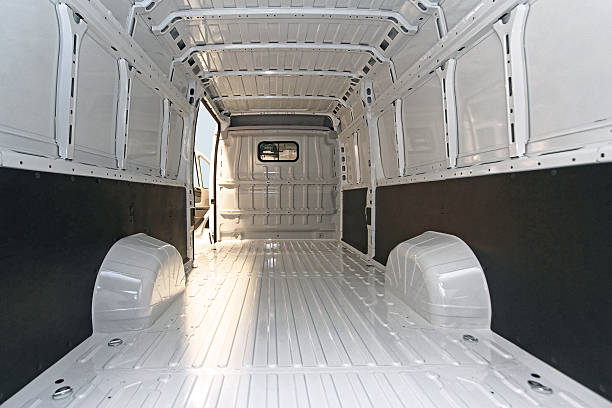Owning a work vehicle is a big responsibility. It holds equipment, supplies and tools essential to your livelihood. Upfitting your van with equipment like drawers and shelving units can boost worker efficiency by cutting down turnaround times.
Liner kits are lightweight and easy to install. They also help your fleet get better gas mileage by insulating the interior.

Customization
When you’re evaluating van liners for your fleet, the quality of materials and functionality are important considerations. You’ll want to find a cargo van that looks clean and offers simple installation, so you don’t have to pay for labor costs or rely on staff members with specific skillsets. Additionally, liners are designed to help reduce liability risks for your crew as they work inside of the vehicles
Van floor liners keep the interior of your vehicle looking new, protecting it from scratches, stains, and general wear and tear. This helps retain resale value for the vehicle, and it prevents unnecessary damage to tools and equipment inside of the van.
A liner for the cargo area also offers heat retention and sound deadening options to keep the interior of your vehicle as comfortable as possible. This can be especially useful in hot weather, when the contents of the van can make the interior unbearably warm.
Van door panels are often uniquely shaped, so you’ll need to find a liner that matches their contours perfectly. Fortunately, there are plenty of options available, including plastic 3/16-inch door panels from Legend Fleet and vanLiner. They gel with your GMC Savana or Chevy Express van’s doors, shielding them from scrapes and dents. They’re also lightweight so they won’t raise your fuel consumption. The liners are easy to install and come with everything you need.
Protection
The job of your cargo van takes it through tough conditions, and its interior gets a beating. Bullet Liner helps keep your vehicle looking new and ding-free, increasing its remarketing value. They also provide a cushion for cargo, dampening impacts and noise. And since plastic liners are lightweight, they don’t add to your cargo weight and cause a drop in gas mileage
Boxes falling, equipment shifting – without liner protection, these common occurrences can leave ugly sidewall dents on your fleet of cargo vans. Those dents not only make your vehicles look bad, but they can damage the metal sheet metal and create costly bodywork repair costs.
Our wall panel liners protect the sheet metal of your van, and come in a variety of thicknesses for your specific needs. They feature protective ribs molded to the van walls and can be used alongside shelving modules or other upfit components.
Door liners are made from the same material as our wall panels, but they are designed to cover your cargo van’s doors. They are precision-cut to fit specific models of Chevy Express or GMC Savana cargo vans, and feature a 3/16-inch rigid plastic construction with a foam and foil insulation backing that gives them an R4 thermal barrier.
Legend floor mats are great for protecting the cargo floor from damage and providing safe traction when driving or loading your cargo van. The non-stick design helps prevent the cargo from sliding, and they are easy to clean with a spray hose and simple soap and water.

Convenience
Cargo vans offer plenty of options for upfitting to make the vehicle work exactly how you need it to. Whether you’re a delivery person, plumber, electrician or landscaper, your van can be equipped with seating for 12, six, four or no seats at all; shelving modules and drawers for storage of small parts and tools; partitions to separate the cargo area from the passenger cabin and more.
You can also add interior roof racks, cargo doors, different windows, awnings and more. Having the ability to transport everything you need in one trip to the job site makes a big difference for your productivity and reduces the chances of lost or misplaced equipment and materials.
When you’re hauling valuable and fragile goods, a cargo liner protects your investment by keeping it secure in transit. This prevents damage that can lead to stalled projects, ruined customer relationships and expensive repairs.
In addition to protecting your van’s panels from wear and tear, liners also help with sound deadening. This improves the ride quality and comfort for passengers while driving your business van. Plastic liners are lightweight and easy to install. They don’t add a lot of weight to your van and won’t cause a significant drop in fuel economy. Choose a kit that comes with all the necessary hardware and instructions for easy installation.
Insulation
Anyone who uses a van or truck for work knows that it’s the heart of their business. Valuable equipment, tools and supplies are transported in these vehicles, which must be kept in tip-top shape. Otherwise, lost profits, delayed projects and strained customer relationships can result.
Cargo van liner provide a layer of insulation, helping to reduce noise and keep the temperature inside the vehicle more consistent. They also prevent dents and scratches in the walls of the van, extending their lifespan and maintaining their resale value. In addition, they are resistant to chemicals and gasoline, preventing damage to the underlying metal panels.
Insulation options for vans include fiberglass insulation, foam board insulation and rock wool. Fiberglass is a common choice for homes, but it’s not ideal for vans because it has low R-value per inch and tends to release harmful particles when compressed. Foam board insulation is more expensive, but it provides a much better R-value per inch and doesn’t release toxic particles. Rock wool is a semi-rigid batting material that provides excellent R-value, and it’s much easier to work with than fiberglass.
Insulation upgrades can be used alongside shelving packages that are often installed in cargo vans to store equipment, materials and tools. This allows them to be accessed and organized quickly while keeping the van insulated from the cold or hot air coming in through the doors.




